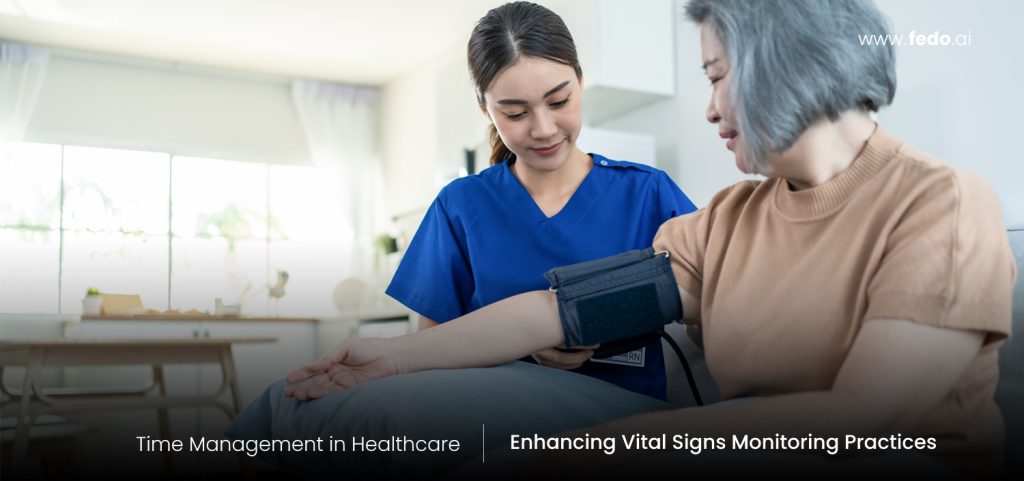
In the fast-paced environment of a hospital, efficiency, and accuracy in patient care are paramount. One critical aspect of this care is the measurement and recording of a patient’s vital signs—essential indicators of a patient’s health status. However, the process of capturing these vital signs can be time-consuming and prone to interruptions, impacting both patient outcomes and healthcare staff productivity.
The Challenge of Measuring Vital Signs
Recent studies have shed light on the time nursing staff spend on measuring and recording vital signs. When analyzing the data, several key observations emerge:
1. Standard Observation Rounds:
The average time to measure and record a set of vital signs, excluding non-vital sign-related interruptions, is approximately 5 minutes and 1 second. This interval suggests a fairly efficient process but still adds up across multiple patients and shifts.
2. Including Interruptions:
When interruptions are factored in, the time extends to around 6 minutes and 26 seconds per patient. These interruptions can range from non-urgent inquiries to procedural delays, further straining the nursing staff’s time and resources.
3.Bedside Observations Only:
Focusing purely on the bedside measurement, the time taken is reduced to about 3 minutes and 45 seconds. This figure indicates that the actual process of taking vitals is quick, but other factors contribute to the overall time taken.
Despite these detailed insights, the study found no substantial differences based on the hospital, ward, or nurse characteristics. This consistency across different settings highlights a universal challenge in the healthcare sector: the need to enhance efficiency without compromising patient care.
The Implications for Healthcare
The time-intensive nature of measuring vital signs has significant implications. Longer durations spent on these tasks mean less time available for other critical activities, such as patient interaction, documentation, and other clinical responsibilities. This can lead to increased stress among nursing staff, potential burnout, and a ripple effect on overall healthcare delivery quality.
Moreover, interruptions not only prolong the time taken but also increase the risk of errors. Inaccurate recording of vital signs can have serious consequences, from delayed treatments to misdiagnosis. Therefore, finding ways to streamline this process is crucial.
Innovative Solutions for Time and Resource Optimization
To address these challenges, healthcare facilities are increasingly turning to technology-driven solutions. One such innovative approach is the integration of advanced ai powered technology that can expedite the measurement of vital signs.
Introducing Fedo Vitals
Fedo Vitals is at the forefront of this technological revolution, offering a groundbreaking solution that promises to transform how vital signs are measured. Utilizing a sophisticated 14-face scan technology, Fedo Vitals can capture a patient’s vital signs within seconds, significantly reducing the time required for these crucial observations.
Here’s how Fedo Vitals can make a difference:
1. Time Efficiency:
The advanced face scan technology streamlines the process, cutting down the time taken per observation set from minutes to mere seconds. This efficiency can free up valuable time for nursing staff, allowing them to focus on other critical tasks.
2. Accuracy and Consistency:
By automating the measurement process, Fedo Vitals minimizes the risk of human error, ensuring that vital signs are recorded accurately and consistently. This reliability can enhance patient safety and improve clinical outcomes.
3. Productivity Boost:
With less time spent on repetitive tasks, nursing staff can experience reduced stress levels and lower risk of burnout. Increased productivity and job satisfaction among healthcare workers ultimately lead to better patient care.
4. Seamless Integration:
Fedo Vitals’ technology is designed to integrate seamlessly into existing hospital systems, facilitating smooth adoption and minimal disruption to current workflows.
The healthcare industry is continually evolving, and the adoption of innovative technologies like Fedo Vitals represents a significant leap forward. By addressing the time and efficiency challenges in measuring and recording vital signs, Fedo Vitals not only enhances productivity but also improves patient care quality. As hospitals and healthcare providers strive for excellence, integrating such advanced solutions will be key to meeting the demands of modern healthcare environments.
Ready to embrace the future of healthcare? Fedo Vitals’ seamless integration and advanced technology await. Reach out to us at hello@fedo.ai for a demo.